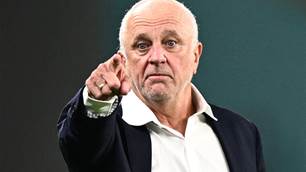AFTER a falling out with Victorian Premier League side Oakleigh Cannons over player substitutions, coach Huss Skenderovic packed his bags and headed to the Middle East.
Armed with nothing more than his coaching CV and a determination to “give it a month and see” the former Melbourne Knights player started cold-calling clubs.
His persistence soon paid off when he was appointed youth technical director for Pro League outfit, Ajman, overseeing the development of 13 to 17-year-olds.
A true trailblazer, Skenderovic is the first Aussie coach to ply his trade in the UAE and these days enjoys a beachfront apartment lifestyle with his young family.
But it’s the professional facilities that are truly jaw-dropping, underlining the growing gulf between Australia and the oil-rich leagues.
“When you see the facilities and the wealth that they have, and the way they use their facilities you think, this is what football should be like,” Skenderovic said.
“The club’s only 40 years old but they’ve invested in infrastructure like the stadium and grounds. Every junior team here has its own training ground and its own medical facilities.
“Seeing what they do for their players and how they look after them makes me think to myself – we’re miles away from anything like this back home in Australia.”
Ajman has embraced an ambitious youth development program and already Skenderovic is seeing the results on the park. They are playing some “nice football”, he said, assisted by world class facilities.
“I think the difference at youth level is that here they’re professional and in Australia we’re still a little bit way off,” he said.
“Here they have the structure in place to be professional such as their training ground and they train every day and get a wage on top of it. Can you imagine 13, 14, 15, 17-year-olds getting paid a wage to play football?
"It’s like an apprenticeship and very similar to what they do in the UK and other places.”
On the flipside, he said, is the lack of urgency to succeed.
“When you’re an Emerati you’re basically set for life,” he added. “If you don’t make a career in football it doesn’t bother you because you’ve got your family’s wealth and the government to help you.
“So they don’t have that drive and they don’t have that passion, number one. Number two, why would you ever want to leave here? “
The Middle East is a transit lounge for those with ambitions of building a reputation and those who are cashing in on one.
Since his arrival, just four months ago, Skenderovic has caught up with the likes of Socceroos Lucas Neill (Al Wasl) and Sasa Ognenovski (Umm-Salal).
He's chatted with FFA technical director Han Berger on the sidelines of the U19 Championship in the UAE while watching his nation’s up-and-coming players put through their paces.
He has travelled more than 11,000 kilometres to come face to face with some of Australia’s best and brightest.
He is settled and restless all at once. In July he completes the second part of his AFC A-Licence.
The current gig he sees as a three-year project and after that, who knows? An assistant coaching role or perhaps an opportunity to break into the A-League or national team set up.
But despite his new life, the significance still lingers of Skenderovic's late night sacking by Oakleigh Cannons, when he was accused of failing to put his best team on the park.
He sees the incident as representative of the growing tension between an increasingly educated coaching class and the old-style club culture that still holds the reins.
It is only a matter of time, the Aussie coach said, before more follow the lead of Phil Stubbins (Bangkok Glass) and Skenderovic’s predecessor at Oakleigh, Arthur Papas, who coaches the India National U23s and the Pailan Arrows.
He added: “Australia coaching education is really moving forward and a lot of coaches have this desire to progress and learn more. It’s fantastic because what we’ve really lacked over the years is quality coaching.
“You try and bring that back to the top leagues in Australia or state league competition but the committees and people involved in these clubs are miles behind anything in that regard.
“Some of them have been at the club for 40 years, and some that have been there since they were children have never played the game but their fathers were involved.
“But they still want a hands on say about what happens on the training ground, who should be playing and you think, like hang on a minute, why did you appoint me?
“I got to the stage where it happened before at another club that I was at in the state league and I just said, nah that’s enough I just can’t do this anymore. I thought well it’s just time to look abroad.”
Related Articles

Matildas 'have parked' 7-0 thrashing: 'We're one of the best pressing teams in the world'

Socceroos coach says Argentina can only 'play two ways'













